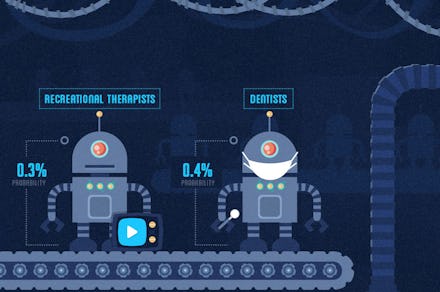Here Are the First Jobs Robots Will Take Over, in One Chart

As conversations about robots entering the workforce start to percolate, the question stands: Who gets to keep their job, and who will be replaced by a digital counterpart?
After all, cars are more often than not manufactured by robots. Amazon's Internet-connected warehouses are already full of automatons, and the future of emergency response units may be based on the Atlas robot from Boston Dynamics. Even journalists aren't safe.
Thanks to a chart from the site Futurism, relying on data from the University of Oxford, we now have an idea of who will be replaced and how quickly.
The takeaways: For starters, about half of the existing jobs in the United States could go autonomous in the next 10 years. And while dentists are probably going to keep coming to the office for a while, the same can't be said for telemarketers or anyone who cold-calls strangers for a living.
However, anything in the creative scope — that is, anything that can't really be delegated to a piece of software — should be safe for a while. That includes athletic trainers, chemical engineers, recreational therapists and editors.
Plus, members of the clergy have a less than 1% chance of being made redundant, meaning we probably won't be seeing Futurama's Reverend Lionel Preacherbot any time soon.
Here's the chart in full:
The big question: When robots take over our jobs, how will we afford to live?
There may be a new economical solution: As Mic reported in June, a concept called "basic income" would pay people living wages for simply being human — letting robots do all the circuit board-breaking labor. Right now, it hasn't been put in place anywhere in in the world. But it's likely to become a popular progressive cause as we figure out how to curb homelessness and hunger in a future that puts a lower value on human labor.
And if Futurism's predictions are right, the telemarketers should be hoping basic income becomes a serious conversation sooner than later.
h/t Futurism